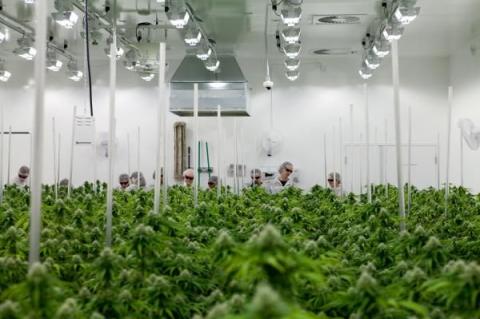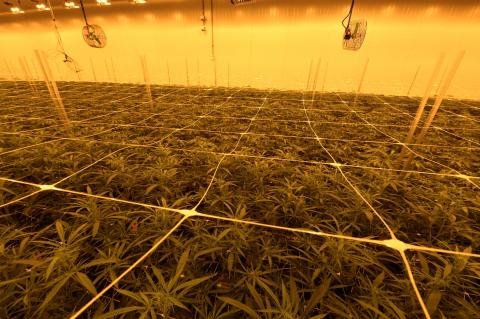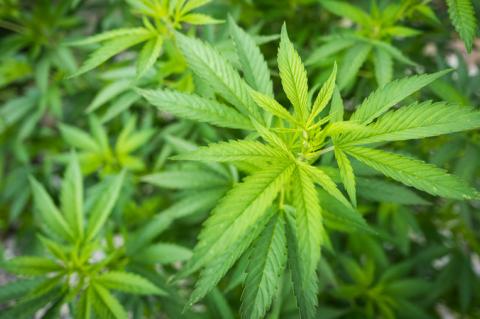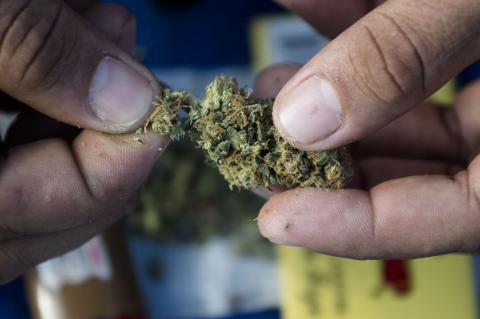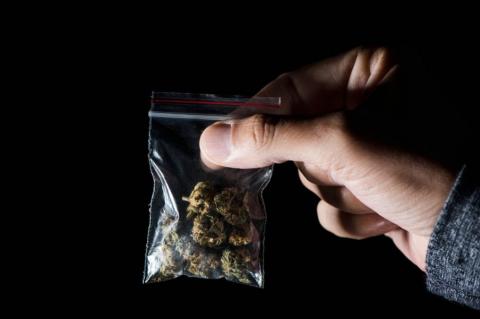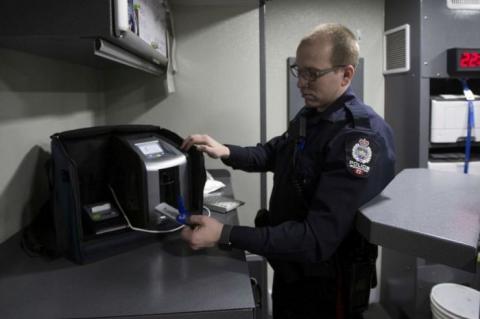Get the top 5 cannabis articles daily
highgreennews
Latest posts
The Challenges of the American Hemp Dream
Struggling American farmers felt like they had just received a stay of execution last year when the word came down the pike that industrial hemp production was on its way to becoming legal again in the United States.
It meant they would no longer have to nickel and dime themselves to death by exclusively dedicating acreage to traditional crops like corn and wheat, and they might even be able to stay in the agricultural game long term without the risk of being put out to pasture.
- Read more about The Challenges of the American Hemp Dream
- Log in to post comments
Europe: The Next Big Cannabis Market?
While the Canadian cannabis market has had some hiccups and the U.S. market continues to face legal hurdles, the rest of the world, and particularly Europe, is starting to emerge with fast-growing potential, officials at three globally engaged cannabis companies said Tuesday.
- Read more about Europe: The Next Big Cannabis Market?
- Log in to post comments
As Russian Money Poured Into Cannabis, Giuliani Allies Scrambled to Partake
SAN FRANCISCO — At a restaurant meeting in California a few years ago, Brad Hirsch and one of his law clients gathered over a meal with two potential business partners: Andrey Kukushkin and Andrey Muraviev, an investor who had flown in from Russia.
Taking the guess work out of analysing cannabis edibles
Cannabis, hemp and CBD experts, Dr Kaveh Kahen and Dr Toby Astill, discuss the analysis process for cannabis edibles, outlining the challenges and solutions available.
In 2017, the Specialty Food Association predicted that cannabis would be a leading trend in the food and beverage industry from 2018 onwards. Since then, several global food and beverage manufacturers have shown a strong interest in this space, having explored the addition of legalised cannabis to their product portfolios.
Cannabis Investment Manager: Canadian Woes Are Hurting US Stocks
As Canada marks the one year anniversary of legal cannabis, Canadian marijuana stocks have plunged in value, and that appears to be hurting U.S. stocks in the sector, a major investor in the space said Tuesday at the Benzinga Cannabis Capital Conference.
The two should be separated, said investor Jason Wild, president and chief investment officer of JW Asset Management.
First U.S. Cannabis Restaurant Opens in Los Angeles
America’s first cannabis restaurant, Lowell Cafe, opened at the beginning of October in Los Angeles. “Yes, we are real AND legal,” the establishment’s website proudly announces. At Lowell Cafe, the food itself will not be infused with cannabis, but a range of pot pre-rolls, vapes, pre-packaged edibles, concentrates and extracts are available for sale—and immediate consumption—alongside high-quality cuisine. The restaurant also provides pipes and bongs, which can be used in the dedicated smoking areas.
The Blooming Medical Cannabis Industry
Almost three years after the first medical marijuana dispensary opened in Puerto Rico, the medical cannabis industry is blossoming into a fertile enterprise, generating a monthly average of $4 million in sales, despite a few setbacks.
Since its inception until last August, sales and services reported to the government amount to $128 million, with businesses paying $13.9 million for the sales and use tax (IVU by its Spanish acronym), according to the Treasury Department. So far this year, tax revenues from medical marijuana have increased by 127.5 percent.
- Read more about The Blooming Medical Cannabis Industry
- Log in to post comments
Weed breathalyzer may reassure Policymakers
When New Jersey lawmakers debated earlier this year whether to legalize recreational use of marijuana, the Garden State’s police organizations were adamantly against it.
The cops said that legal weed might lead to an explosion in the numbers of impaired drivers operating under the influence. And the police would be caught flatfooted trying to tell whether drivers they pulled over were high or not.
“With alcohol, if you have over 0.08% in your blood, there’s the presumption that you’re intoxicated,” said Christopher Leusner, head of the New Jersey State Association of Chiefs of Police.
“There hasn’t been a blood test or a breath test that can determine if you’re impaired by marijuana.”
Now there is.
It’s a breathalyzer device developed by Hound Labs in Northern California. It’s portable and can run tests for both alcohol and marijuana. It just may change the minds of many of those reluctant police officers, including in Pennsylvania as lawmakers consider several proposals to legalize recreational marijuana use.
Intrinsic Capital Partners, a Philadelphia growth equity fund, is so convinced of a “potential massive market” for the device that it led a $30 million Series D financing round to bring it to market in 2020.
Mike Lynn, a veteran emergency department physician from Oakland, Calif., developed the Hound in collaboration with researchers from the University of California at Berkeley and San Francisco.
Lynn also happens to be a reserve deputy sheriff.
“It’s about creating a balance of public safety and fairness,” Lynn said. “I’ve seen the tragedies resulting from impaired driving up close. And I have a good idea how challenging it is at the roadside to know whether someone smoked pot recently. But I believe if someone is not stoned, they shouldn’t be arrested.”
Blood tests for marijuana can return a positive result even if someone has used cannabis within the last three weeks.
Lynn claims that his device can detect whether someone has smoked or ingested a marijuana edible within the last three hours.
A Canadian start-up, called SannTek, has a device in development with similar capabilities.
The Hound is comprised of a base station and a hand-held device that together will retail for about $5,000 a unit. The entire machine will be manufactured in the United States, Lynn said. Each test also will require a $20 onetime use cartridge.
“We have spoken with law enforcement agencies and large employers, and from our perspective, there’s a huge, untapped market and unmet needs for something like this,” said Howard Goodwin, principal at Intrinsic Capital Partners.
Dick Wolf, the creator of TV’s Law & Order, is also an enthusiastic Hound backer. So is Benchmark, the Silicon Valley venture capital powerhouse that put up seed funding to Dropbox, Snap, Uber, and WeWork.
“It’s a game changer,” said John Hudak, a senior fellow at the Brookings Institution who has written extensively on marijuana legalization.
“I’ve been saying for years it’s only a matter of time before someone developed the technology and got the science right,” Hudak said. “That time apparently is now. And they’re going to make a hell of a lot of money selling it to law enforcement agencies across the U.S. and Canada.”
Goodwin said about 50 million drug tests are conducted each year. He believes the market for a THC breathalyzer may be worth well above $10 billion annually.
About 30 states have legalized cannabis. Pennsylvania and New Jersey are among the dozens with medical marijuana programs. The governors of both states support legalizing it for recreational use. And polls in both states show the majority voters would support full legalization.
But traditionally, law enforcement has been resistant to legalization.
Leusner, the head of the New Jersey police chiefs group, said prosecuting marijuana DUIs is costly and time-consuming.
Marijuana DUI cases hinge on blood test results. Traces of THC metabolites, the drug’s byproducts, can remain in the body for up to a month. Proving impairment is notoriously difficult. There is no “per se” standard, or legal threshold, of what constitutes intoxication. Often, cases get thrown out of court.
Officers who are qualified drug recognition experts and trained to spot stoned drivers can spend up to two days in court on the stand. “That’s expensive,” Leusner said.
John Adams, Berks County’s district attorney, serves on Pennsylvania’s statewide medical marijuana advisory board.
“DUI under marijuana is a huge, huge problem. It’s one of the reasons we’ve been against legalization,” Adams said. “I’ve heard about the breathalyzers. If the technology is out there, it would be a great tool. It would alleviate some of our fears.”
Police have depended on the skunky stench of burnt marijuana to provide probable cause to search a car or conduct a field sobriety test on a driver. But a recent court ruling in Pennsylvania maintained that the smell alone isn’t sufficient reason to initiate an arrest.
In addition, cannabis consumers in many states are slowly trending toward edibles — from pot brownies to infused beverages and lozenges — and, until the recent scare, vaping.
So both the Hound and the SannTek breath analyzers appear to be arriving at the perfect moment.
The Hound breathalyzer, which is about a billion times more sensitive than a standard alcohol breath test, can detect the incredibly low concentrations of THC that are transported through the bloodstream and subsequently exhaled.
“We wanted to be able to detect THC in people who have recently used it — either eaten the stuff or smoked a joint,” said Lynn. “Those are the people we want to discourage before they go to the workplace or get behind the wheel.”
Lynn said he envisioned the device nearly eight years ago when a car drove past him trailing a cloud of weed smoke. But the technology did not exist to create an affordable device.
“I didn’t realize how hard it was going to be.”
In about eight months, Lynn’s team was able to detect THC in the breath of smokers. It took five more years to consistently and accurately measure levels with a machine with a cost in reach of most police departments and employers.
“We could measure small amounts quickly, but it took considerably longer to do the science and complete the clinical studies,” Lynn said.
Though Lynn envisions the nation’s police departments as his first customers, he believes that businesses will adopt the Hound.
“Employers have the same fundamental problems as law enforcement,” Lynn said. “They need to maintain a safe workplace, but not have to worry about what their employees do in their free time. Someone can go home, smoke pot just like I’d enjoy a glass of wine, and not test positive.”
“Employers are facing a workforce now that has close to full employment,” Lynn said. “They don’t want to be firing valuable workers, especially for something that’s legal in most states.”
- Read more about Weed breathalyzer may reassure Policymakers
- Log in to post comments


